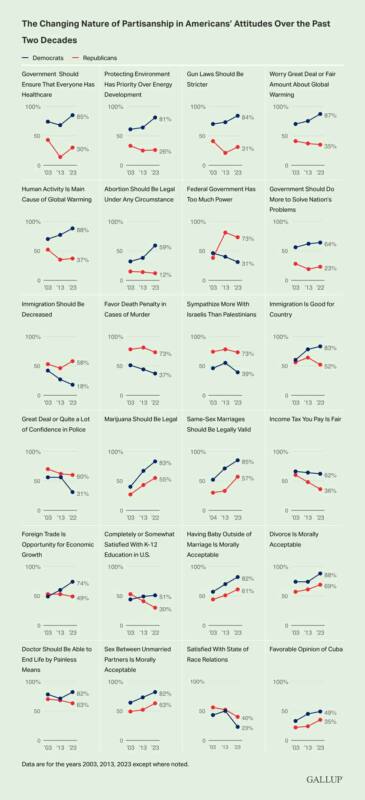The partisan gap between Republicans and Democrats on important issues is growing wider.
“Political polarization since 2003 has increased most significantly on issues related to federal government power, global warming and the environment, education, abortion, foreign trade, immigration, gun laws, the government’s role in providing health care and income tax fairness,” a new Gallup poll finds. “Increased polarization has been less evident on certain moral issues and satisfaction with the state of race relations.”
These gaps have shifted over time, ending in a situation wherein the largest gaps in the latest available data appear in views on the government’s role in providing health care, global warming and environmental issues, gun laws, abortion and the role of the federal government. Indeed, government actions are driving the country’s polarity.

“Americans’ political identity arises from a number of sources, and it’s possible that Americans’ position on issues helps them settle in on their partisanship,” Gallup said. “And once a person has established their partisan leanings, the party’s platform (often amplified by partisan media consumption) can in turn be a factor in reinforcing the individual’s position on social and political issues.”
The consequences of the type of issue polarization reviewed in this analysis are widespread. The division in issues positions between parties, for one thing, can mean there is little variation within parties, which in turn can mean that choice of candidates in primaries can depend on how strongly the candidates profess allegiance to the party’s positions and on non-issues factors such as personality, character and history.
Gallup’s analysis six years ago concluded that “Republicans and Democrats over the years have increasingly diverged in their opinions on a number of important policy and social issues.” That statement remains true today for some issues, based on a more detailed analysis of long-term trends, but the current analysis reveals that steady increases in the partisan gaps are by no means universal across all issues.
The data also reveals Americans are not optimistic about the future.







